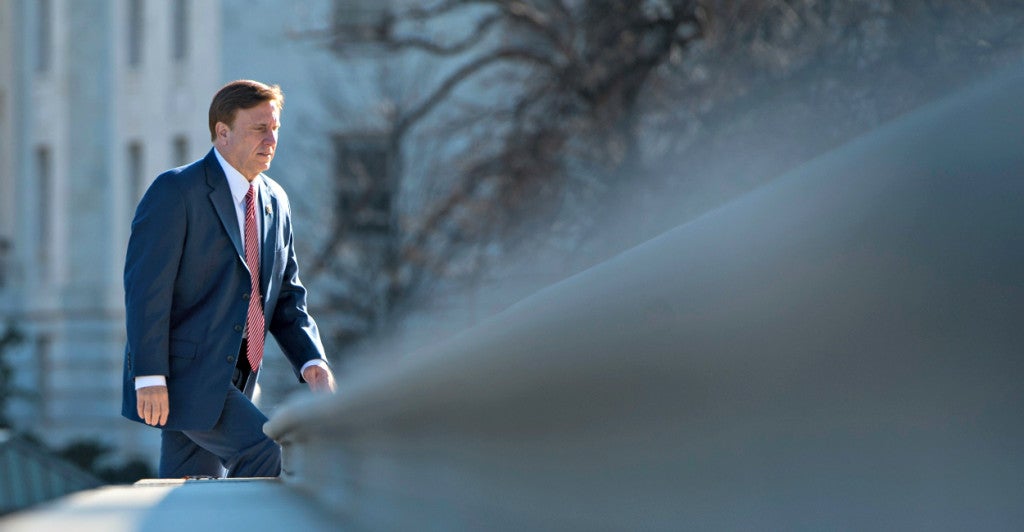The Senate keeps making it harder for House Speaker Paul Ryan to sell an unpopular budget to the Republican conference. Appropriators in the upper chamber have complicated Ryan’s task by calling for “clean” spending bills free of controversial policy riders.
A major selling point for conservatives, these amendments–known as policy riders–are attached to larger bills to achieve policy victories for measures that have little chance of becoming law on their own.
“If the Senate’s only going to consider ‘clean’ appropriations bills,” Rep. Bill Flores, R-Texas, told reporters, “why are we bothering trying to placate them with a $1.07 [trillion] number?”
Flores, who is chairman of the influential Republican Study Committee, said Wednesday morning that if policy riders are off the table, conservatives should be even more opposed to leadership’s budget blueprint.
The skirmish over policy riders further complicates a brawl that has been raging inside the Republican caucus in Congress for the past three months.
Leadership has fought to retain last year’s Bipartisan Budget Act, which sets total government spending at $1.07 trillion. But conservatives want to scrap that agreement and reduce spending to the $1.04 trillion established in the 2011 Budget Control Act.
The longer that fight continues, the less likely Ryan’s reform agenda for 2016 becomes.
If lawmakers would pass a budget, the Wisconsin Republican has argued, the House can start allocating funding and pursue conservative reforms to entitlements, taxes, and welfare programs through policy riders and other parliamentary mechanisms.
And there’s a precedent for that premise. Policy riders often are deployed to achieve significant political lifts that would be impossible otherwise. During the spending fight in December, the House advanced a rider that rolled back a 40-year-old ban on oil exports.
Members of the Republican Study Committee submitted more than 200 riders to appropriations bills in 2015, Flores boasted. Of those, 13 made it into the omnibus spending bill, including amendments to prohibit the Food and Drug Administration from funding the genetic modification of human embryos and to bar funding for the close of the prison at Guantanamo Bay.
“We lose the ability to attach these policy provisions if we don’t have a real appropriations process,” a Ryan aide told The Daily Signal on Thursday. “One thing that would ensure a real appropriations process is adopting a budget.”
Defeating the Purpose
Ryan has made it a priority to change the way the House allocates taxpayer dollars. The speaker has pushed Congress to kick its habit of approving government spending all at once in an omnibus spending bill. Instead, he wants Congress to approve spending for individual government programs by voting on12 separate appropriations bills.
For months, GOP leadership has pushed the Republican conference to sign off on higher top-line spending numbers, so Congress can begin to pass appropriations bills. Start that process, leadership argues, and conservatives can achieve victories with policy riders.
But Rep. John Fleming, R-La., who has pushed numerous policy riders, said he “doesn’t find that argument compelling.” To make his case, he points to recent remarks from a top appropriator in the Senate, Sen. Lamar Alexander, R-Tenn.
Alexander recently said the Appropriations Committee would take up only bills that are “clean” of what he considers “controversial riders.”
Fleming told The Daily Signal that move “defeats the purpose” of funding the government through individual appropriations bills, rather than a catchall omnibus spending package. Cutting out policy riders hamstrings Congress, he argued.
“That’s how conservatives implement policies,” he said. “That’s the sole power of the House of Representatives to shape policy through the power of the purse.”
‘Why Bother?’
House leadership has lobbied conservatives to support higher-spending levels in exchange for an opportunity to attach policy riders to 12 individual appropriations bills. That reasoning sounds hollow now that Senate leadership seems to oppose any controversial riders.
However, Flores, who regularly consults the speaker, said he doesn’t blame Ryan. He blames the Senate for letting down its end of the agreement.
Asked if House leadership trusted the Senate to take up individual appropriations bills with conservative policy riders, Flores said, “I think [Ryan] believed it. I really do.”
That frustration isn’t exclusive to the House.
“Leadership has been telling us for months we have to do a budget at higher levels of spending if we want to accomplish conservative policy goals,” a conservative Senate aide told The Daily Signal. “Now we are being told no policy changes will be allowed through appropriations bills? Then why are we even bothering?”
More Talks
On Wednesday, the House Budget Committee approved a blueprint that sets spending at $1.07 trillion. But it’s unclear if that proposal could win the 218 Republican votes needed to pass out of the House.
Leadership has had a hard time whipping support for the budget resolution. Majority Leader Kevin McCarthy, R-Calif., signaled Thursday that party brass needed more time to gather support for the measure before bringing it up for a vote.
McCarthy, who controls the legislative schedule, told reporters that more talks “will be required before moving the budget to the floor.”
The Republican Study Committee, whose ranks swell past 170, already has registered opposition. The roughly 40-member Freedom Caucus, made up of conservatives, also opposes the measure
